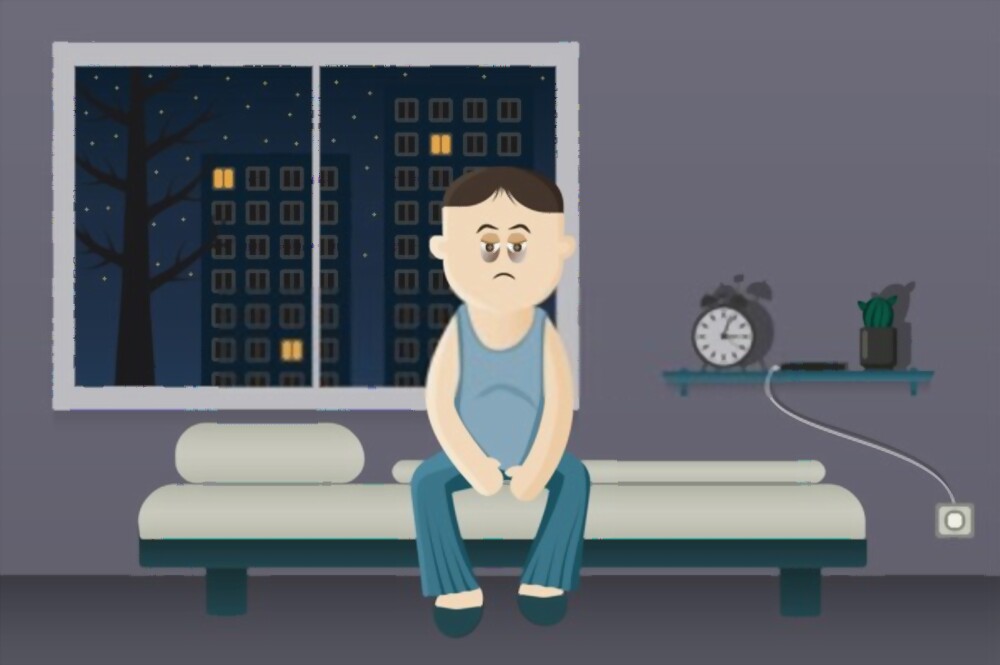
The longest period a human has gone without sleep is just under 19 days. The record was set at the conclusion of a rocking chair marathon, during which the participants reported hallucinations, paranoia, blurred vision, slurred speech, and memory and concentration lapses as a result of their extended sleep deprivation.
It’s estimated that 70% of Americans have trouble sleeping on a consistent basis. That’s a lot of people lumbering through life in a diminished state of consciousness and overall body function. Scientifically, being awake for 17 straight hours is enough to affect your performance physically and mentally.
While being sleep deprived for a few nights won’t kill you, prolonged sleep deficits are associated with depression, obesity, immune dysfunction, metabolic syndrome, and even cancer.
Indeed, anyone who’s gone a few nights without adequate rest will attest that sleep is paramount to our health, attitude, and happiness.
Sleep – A Matter of Body Chemistry
Your body runs on chemicals. If you want to sleep, wake up, cry, run, laugh, digest a handful of jelly beans, or fall in love, your body has to make chemicals. With this in mind, if we want to ensure a good night’s rest, we have to limit the ways in which we artificially alter body chemistry.
Sleeping pills are definitely not the answer. While I do believe that adequate rest is important to every aspect of life, the side-effects of sleeping pills are not an acceptable trade-off. Sleep “at any cost” only leads to more problems.
Sleep aids are only a Band-Aid. They create a situation in which the body has to fight its way back to balance. This only leads to more stress on body systems and more health challenges overall.
Here is a list of ways to keep a natural balance of body chemistry for a better night’s sleep:
1. Light by Day, Dark by Night
 When your nervous system senses light, hard-to-pronounce chemicals are synthesized by your body to wake you up. When your environment is dark, other hard-to-pronounce chemicals are produced to make you sleep. Knowing this allows us to manipulate our sleep environment to take advantage of these natural biological responses.
When your nervous system senses light, hard-to-pronounce chemicals are synthesized by your body to wake you up. When your environment is dark, other hard-to-pronounce chemicals are produced to make you sleep. Knowing this allows us to manipulate our sleep environment to take advantage of these natural biological responses.
Our hunter-gatherer ancestors didn’t have hundreds of artificial light sources (TVs, computer screens, cellphones, lamps) to interrupt their natural sleeping patterns. They slept at sunset and awoke at sunrise. The body is actually programmed to do this.
Unfortunately, most of us aren’t able to live life by the Earth’s rotation. We can, however, control our exposure to light and its intensity to create the right environment for both wakefulness and slumber.
Your bedroom should be dark, free from distractions and stimuli, and used only for sleep (and that other thing!)
When you go to bed, eliminate as much light as possible. Turn the alarm clock around, turn off anything that glows, unplug the nightlight, use blackening shades, even put something dark over your eyes like an eye-mask. Get the room as dark as you can to ensure you’re utilizing those sleep chemicals optimally.
2. Manage Your Intake of Meds and Supplements
I know from personal experience that supplements can wire you. I once stayed awake for two straight days without so much as a hint of exhaustion because of the immune boosters I was taking at bedtime. Many medications act as stimulants as well, so check for insomnia as a side-effect of any meds you’ve been prescribed.
Taking Vitamin D too late in the day can keep your body on overdrive, too.
A surge of Vitamin D in the bloodstream makes your body think it’s being exposed to sunlight and consequently triggers all the hormonal responses that would naturally occur as a result. Making your body think it’s daytime is not going to help you get your zzzs.
Take your supplements in the morning or mid-day unless a health professional instructs you otherwise.
3. Control Your Food Intake
 The body uses a lot of energy for digestion, so the processes of eating and sleeping are very much intertwined with one another. If you’re eating too close to bedtime, or you’re eating foods that are too heavy, the body will not be able to relax enough for you to doze off.
The body uses a lot of energy for digestion, so the processes of eating and sleeping are very much intertwined with one another. If you’re eating too close to bedtime, or you’re eating foods that are too heavy, the body will not be able to relax enough for you to doze off.
Also, eating carbs at night will give you insomnia.
Melatonin is released into your bloodstream in response to darkness and puts you to sleep. However, carbohydrates cause a resultant insulin spike that will interfere with melatonin production.
Stop eating a few hours before bedtime and skip the carb-filled snacks.
4. Time Your Workouts
Your body temperature drops when you sleep. Exercise heats you up. If you’re not allowing adequate time to cool down after working out, that necessary decrease in temperature won’t happen.
If you absolutely have to exercise in the evening, take a cool shower before bed to lower your body temp.
5. Wind-Down
Most of us can’t just come home from a long day, scarf down some food, answer a few work e-mails, and then jump into bed and start sawing logs. If you’re one of those people who can, keep it to yourself or the rest of us will un-friend you from life.
It’s always best to wind down slowly at the end of the day. Read a book, do some yoga, meditate, snuggle with your significant other, etc.
You might even want to dim the lights as though the sun is setting and get those sleep inducing chemicals into your bloodstream.
6. Reduce Your Stress
Stress of any kind, whether physical, emotional, or chemical, triggers the fight or flight response and floods the bloodstream with stress hormones like adrenalin. The “stress response” will increase your blood pressure and heart rate, cause your serotonin levels to drop (insomnia), and chemically prepare your body for rigorous movement (fight or flee).
The absolute best way to reverse the chemical effects of stress is to do something fun.
The body cannot be in a state of protection (fight or flight) and a state of growth (fun and joy) at the same time. It’s physically impossible. This is why it’s essential to make time for your hobbies and doing things that make you happy.
7. Extra Help
If you absolutely need some help getting to sleep, try using whole-food supplements before medication.
Melatonin is the primary sleep hormone and you can get it in supplement form. Some people totally zonk out with this stuff. You can find it in almost any health food store or vitamin shop. Less is more with this one, though.
While science attempts to quantify how much sleep we need, the fact is that we all have different requirements. The goal is to wake up feeling refreshed and vibrant. If you’re not, give these suggestions a try and see if they help.

